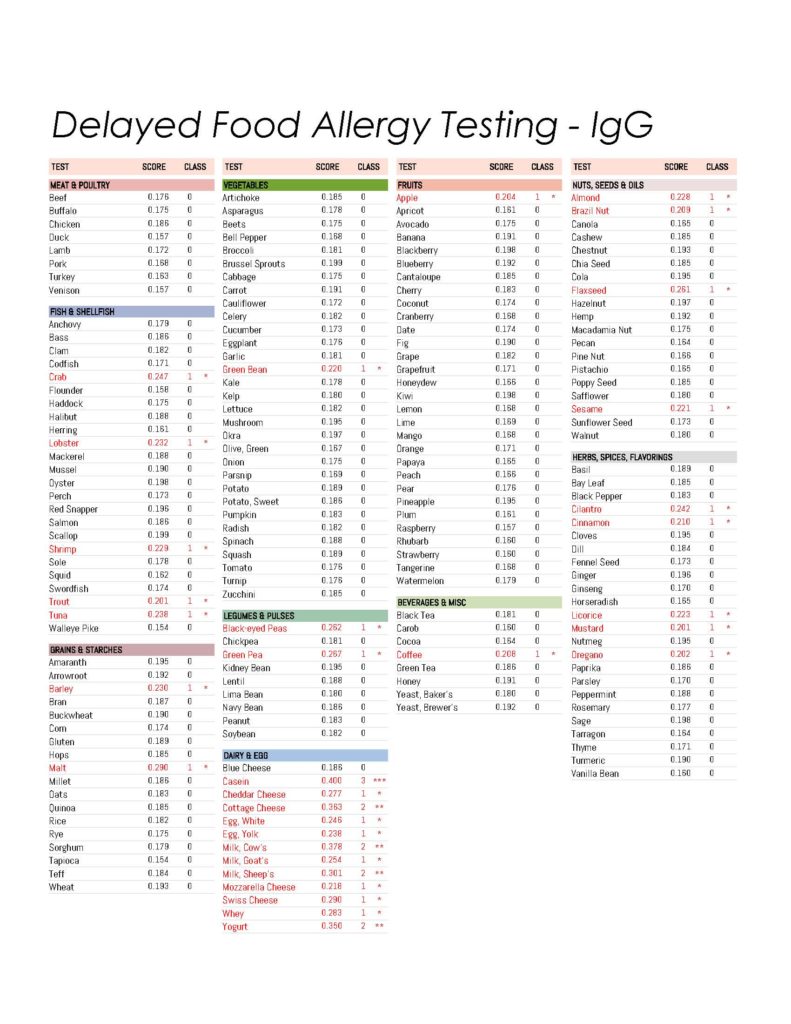IS YOUR MEAL FREE OF KNOWN
DELAYED FOOD ALLERGENS?
M. Moriah Mor - Certified Holistic Nutritionist
CEO, GreenSilk.com
-
Energetic Health Institute
- February 20, 2023
ARTICLE IN A NUTSHELL
1. Healthy for one does not mean healthy for all. What you eat may actually be causing your chronic health conditions – even foods that have been labeled healthy could be causing you harm. Learn how Delayed Food Allergies can affect respiratory, skin, and neurological disorders as well as energy production, inflammation, digestion, depression, and more.
2. Learn the difference between a Food Intolerance & Food Allergies and how to decipher Staples vs. Indulgences. An allergic reaction occurs when your immune system identifies a food or a substance in a food as a danger and becomes activated, triggering a “protective” response.
3. “Why Guess When You Can Know?” There are a few ways people can learn what is best for their body. Elimination is an option; however, it requires discipline in planning, recording, and timing meals. It can be tricky to pinpoint specific foods while consuming other foods. An IgG test eliminates all the guesswork and saves you time, energy, and money.
INTRO
What is healthy for one person to eat may not be healthy for another. That’s where Delayed Food Allergies (DFAs) come in. Food can move the body toward or away from health, affecting hormones, blood sugar, inflammation, detoxification, and the cellular environment within the body.
In this article we will explore one of the principles from our Eating Healthy Sweet 16 teaching concept at the Energetic Health Institute, “Is your meal free of known Delayed Food Allergies,” and assist you in better understanding what healthy means for you!
Studies show DFAs to be a contributing factor in chronic health conditions related to energy production, immune function, digestive tract disorders such as leaky gut syndrome and irritable bowel syndrome, respiratory function, asthma, hormonal balance, skin disorders, eczema, autoimmune disorders, depression, and neurological conditions such as Autism, Alzheimer, and ADHD. (1)(2)(3)(4)
Many healthcare professionals consider DFA testing to be one of the most underappreciated tools in the medical field today. Generally, individuals are only tested for immediate reactions and not delayed responses. Research confirms that by removing Delayed Food Allergens, there is a substantial improvement and often complete reversal of some health conditions. So, in the words of Dr. Henele, “Why Guess When You Can Know?” (5)
Some of the information gathered in this article is based on research and the nutritional education curriculum provided at the Energetic Health Institute.
FOOD ALLERGY VS. FOOD INTOLERANCE?
Studies confirm that the prevalence of food allergies has increased exponentially in the last three decades. The scientific research on allergies is complex; however, some theories include the hygiene hypothesis, genetics, and environmental impacts as some of the contributing factors. Due to the increase in prevalence and severity of DFAs, Congress passed the Food Allergen Labeling and Consumer Protection Act (FALCPA) in 2004. (6)(7)
Approximately 80% of our immune system surrounds the digestive tract. Scientific studies confirm that the gastrointestinal system’s health plays a crucial role in protecting against food intolerances or food allergies. Food allergens are considered pathogens and potentially life-threatening conditions triggered by an immune response to food antigens. In other words, your immune system may identify the food you are eating as an intruder. (8)(9)
A food intolerance is when the body cannot properly digest the food that is eaten or when a particular food irritates the digestive system. Symptoms of food intolerance can include nausea, gas, cramps, stomach pain, diarrhea, irritability, or headaches.
On the other hand, a food allergy is when the body’s immune system, which usually fights infections, reacts to a certain food as an invader. This leads to an allergic reaction: an immune system response in which chemicals like histamine are released in the body. The reaction can cause symptoms such as hives, swelling, vomiting, stomach pain, throat tightness, hoarseness, coughing, breathing problems, or a drop in blood pressure.
More severe long-term effects of DFAs may include autoimmune disorders, depression, ADHD, diabetes, respiratory diseases (asthma), chronic inflammation, immune disorders, leaky gut syndrome, IBS, gestational diabetes, eczema, psoriasis, or neurological conditions such as Alzheimer’s. (10)(11)
Studies confirm the most common delayed food allergens are dairy, gluten/grains (wheat, rye, barley, spelt, kamut, triticale, etc.), yeast, eggs, nuts, fish, fast foods, and pesticides. Additionally, recent studies have linked chronic health conditions and allergies to how the body metabolizes sugars and processed foods. (12)
SYMPTOMS OF FOOD ALLERGIES
- Fatigue
- Inflammatory conditions; sinusitis, rhinitis, arthritis, phlegm
- Dark circles under the eyes
- Dry/burning eyes
- Ear itching
- Chronic ear infections
- Asthma
- Auto-Immune Conditions
- Seasonal allergies
- Eczema & Acne
- Sensitive Skin
- Migraines or Recurrent Head Aches
- Burning or Stiff Sensation in Muscles
- Aches & Pains for no reason
- Chronically Swollen Lymph Nodes
- Nausea
- Frequent Heart Burn
- Cramping Aches & Pains
- Irritable Bowel Syndrome: Alternating Diarrhea and Constipation
- Inflammatory Bowel Disease – Chron’s Disease or Ulcerative Colitis
- Hernias
- Leaky Gut Syndrome
- History of Tonsillitis or Appendicitis

"EHI was a beautiful experience. The teachers and staff are so encouraging and supportive. The energy at EHI makes you believe that everything always works out when you are on the right path. I have learned so much over the course. I feel optimistic and ready to start being amazing."
STAPLES VS. INDULGENCES
At the Energetic Health Institute, we understand the difficulties in maintaining a strict dietary lifestyle. The practice of Eating Healthy is something that should be positive, not restrictive or frustrating, to assist you in maximizing your body’s daily Mitochondrial Energy Production and overall wellness. (13)
Eating Healthy is a practice based on understanding what healthy means for your body and the difference between Staples vs. Indulgences.
A Staple is a food or beverage your immune system agrees can safely be eaten at any meal every day of the month, without any concern about inhibiting your Mitochondria’s ability to produce energy. Therefore, you do not experience intolerance or allergic reactions to these foods. If you do experience a reaction, this food should be eliminated from your diet.
An Indulgence is food that inhibits your mitochondrial ability to produce energy, often creating an Acidic Cellular Environment. Knowing which foods trigger food intolerance and/or allergies can assist you in maintaining a healthier lifestyle. (13)(14)
"Everyone I have ever worked with who has committed to Eating Healthy has enjoyed it so much they seldom stray from the guidelines. And when they do, they get a chance to feel what the foods from their previous lifestyle were doing to them."
- Dr. Henele
WHY GUESS WHEN YOU CAN KNOW?
Delayed Food Allergies can be challenging to diagnose because the effects are not apparent immediately and can be caused by multiple foods, especially if these foods are a staple in your diet or hidden ingredients in something you eat. Not all food allergies require an EpiPen or produce severe reactions such as respiratory restrictions, swelling, or anaphylactic shock. However, the effects of Delayed Food Allergies are endless and can include depression, indigestion, inflammation, asthma, skin conditions, migraine headaches, eczema, arthritis, abnormal weight gain, and so much more.
An IgG Delayed Food Allergy Blood Screen can take the guesswork out of what you should or should not be eating so that you can start feeling energetic and fabulous again!

Head to the Energetic Health Institute today to Order your Delayed Food Allergy Panel and receive a 30 Minute Consultation with one of our Certified Holistic Nutritionists...
FOOD ALLERGY TESTING: IgE VS. IgG
Allergic reactions can be immediate (IgE) or delayed (IgG).
- IgE or Type 1 responses occur within 0 to 2 hours
- IgG or Type 3 responses occur within 2 hours and can last up to 56 days
A classic IgE food allergy is when the immune system produces specific IgE antibodies. These antibodies lead to an immediate allergic reaction (0 to 2 hours). Symptoms such as swelling, breathing difficulty, rash, and/or itchy skin appear within seconds or minutes. IgE tests are generally performed for confirmation. A good starting point in determining a Type 1 response is the Elimination Diet.
The foods that are part of an IgG food allergy are more difficult to pinpoint because the delayed reaction can be from 2 hours to 56 days. For example, symptoms can appear up to three days after consuming the “trigger food(s).” IgG can lead to long-term chronic health conditions, as noted above, if not checked. Fortunately, a reliable diagnostic test consisting of a broad portfolio of up to 270 foods can assist you in finding the foods that are good for you and isolate what foods are causing havoc to your system. Due to the body’s constantly changing internal environment, a DFA test should be conducted every 4-7 years.
FINAL THOUGHTS
Food is meant to be enjoyed and celebrated in the company of those we love. As we have learned, food allergies can cause potentially severe reactions. Eating healthy means eating organic foods that assist the body’s mitochondrial energy production and reduce environmental pollutants, GMOs, and pesticides, which are just some contributing factors to food allergies and their effects on the body. However, even healthy foods can cause allergens. Therefore, take the guesswork out of what you should and should not eat so you may feel healthy, vibrant, and energetic!
All adults, teenagers, and children over 5 can benefit from a food allergy screening. A DFA Blood Screen Test and a 30-minute phone interpretation with one of our Certified Holistic Nutritionists can be a life saver. For more information, visit us at Energetic Health Institute. We will be happy to assist.
To your good health!
ABOUT THE AUTHOR

M. Moriah Mor, a Certified Holistic Nutritionist, is the owner of GreenSilk.com. The company is committed to helping individuals live a healthier lifestyle through education, nutrition, the research of life science, and the development of Professional High-Grade Premium health products.
Recognized for her outstanding dedication and contributions to the health and wellness industry for more than 18 years, Moriah is a graduate of the Energetic Health Institute and the University of Southern California. Her interest is focused on researching the latest scientific breakthroughs in the holistic health field. She is currently working toward her Doctorate in Natural Medicine.






Keep In Touch 1 Email A Week Always Worth Opening
Emails That Will Make You Feel Happy & Hopeful. Quick Reads. Uplifting Podcasts. Always Interesting. Amazingly Helpful Too. Get 1 Email Each Week That You’ll Love To Open.
ARTICLE CITATIONS
(1) https://www.ncbi.nlm.nih.gov/pmc/articles/PMC4757079/
(2) https://www.elemy.com/studio/autism-and-diet/food-allergies/
(3) https://www.brainbalancecenters.com/blog/igg-delayed-food-allergies
(4) https://www.annsaudimed.net/doi/epdf/10.5144/0256-4947.2016.386
(5) https://www.mdpi.com/2072-6643/13/5/1638/htm
(6) https://www.fda.gov/food/food-labeling-nutrition/food-allergies
(7) https://academic.oup.com/cei/article/160/1/1/6428824?searchresult=1
(8) https://www.ncbi.nlm.nih.gov/pmc/articles/PMC5123910/
(9) https://www.sciencedaily.com/releases/2019/06/190624111545.htm
(11) https://onlinelibrary.wiley.com/doi/10.1186/2045-7022-3-12
(12) https://www.mdpi.com/1660-4601/19/8/4503/htm
(13) https://www.sciencedirect.com/science/article/pii/S0092867420316779
DISCLAIMER & COMPLIANCE
***All Information Shared In This Article Is For Educational Purposes Only. All Statements Have Not Been Evaluated By The US Food and Drug Administration (FDA). Go Here For A Current List Of The FDA’s Position On Various Therapeutic Interventions. We Are Required To Inform You That Any Information Presented In This Article Is Not Intended To Advise, Diagnose, Treat, Cure, Or Prevent Any Disease Including COVID. Additionally, We Are Required To Inform You That Any Information Presented In This Article Is Not Intended To Constitute Legal Advice Or Service. Always Consult With Qualified Licensed Medical Professionals & Legal Experts Before Enacting Any Information Presented Herein.***
***Please Be Aware That At No Time Will EHI Offer Advice, Guidance, Or Direction With Respect To Whether Or Not An Individual Should Or Should Not Receive COVID Gene Modification Shots In Clinical Trial According To The National Institutes Of Health (NIH). We Encourage All People To Review Available Safety & Efficacy Data, Published By The CDC Through The Vaccine Adverse Events Reporting System (VAERS) And The CDC’s COVID Data Tracker, With Their Trusted Healthcare Team And Make The Decision That Is Right For Them. We Support Every Individual’s Rights As Patients To Agree To Or Decline Any Medical Procedure As Stated In The American Medical Association’s Code Of Medical Ethics 1.1.3(d).***
***In A Transparent Effort To Be In Full Compliance With The US Food and Drug Administration (FDA) and Federal Trade Commission (FTC) Regarding Prevention, Treatment, & Deceptive Practices (15 U.S. Code § 57b & Section 19 of the FTC Act), We Are Required To Notify You That The Information Presented In This Article Is A Collection Of Peer-Reviewed Empirical Evidence, But Has Not Yet Been Evaluated By The FDA For Safety & Efficacy. None Of The Information Provided Is Intended To Replace The Care And Supervision Of Qualified Licensed Medical Professionals Or The Legal Advice Of Licensed Attorneys.***
***Please Be Aware That At No Time Will EHI Offer Advice, Guidance, Or Direction With Respect To Whether Or Not An Individual Should Or Should Not Receive COVID Gene Modification Shots In Clinical Trial According To The National Institutes Of Health (NIH). We Encourage All People To Review Available Safety & Efficacy Data, Published By The CDC Through The Vaccine Adverse Events Reporting System (VAERS) And The CDC’s COVID Data Tracker, With Their Trusted Healthcare Team And Make The Decision That Is Right For Them. We Support Every Individual’s Rights As Patients To Agree To Or Decline Any Medical Procedure As Stated In The American Medical Association’s Code Of Medical Ethics 1.1.3(d).***
***In A Transparent Effort To Be In Full Compliance With The US Food and Drug Administration (FDA) and Federal Trade Commission (FTC) Regarding Prevention, Treatment, & Deceptive Practices (15 U.S. Code § 57b & Section 19 of the FTC Act), We Are Required To Notify You That The Information Presented In This Article Is A Collection Of Peer-Reviewed Empirical Evidence, But Has Not Yet Been Evaluated By The FDA For Safety & Efficacy. None Of The Information Provided Is Intended To Replace The Care And Supervision Of Qualified Licensed Medical Professionals Or The Legal Advice Of Licensed Attorneys.***
©2013-2023 Energetic Health Institute. All Rights Reserved. Born To Teach, To Heal & To Lead With Love. Let's Make Tomorrow AMAZING!
EHI Privacy & School Policies | Awesome Theme by: D5 Creation | Powered by: WordPress